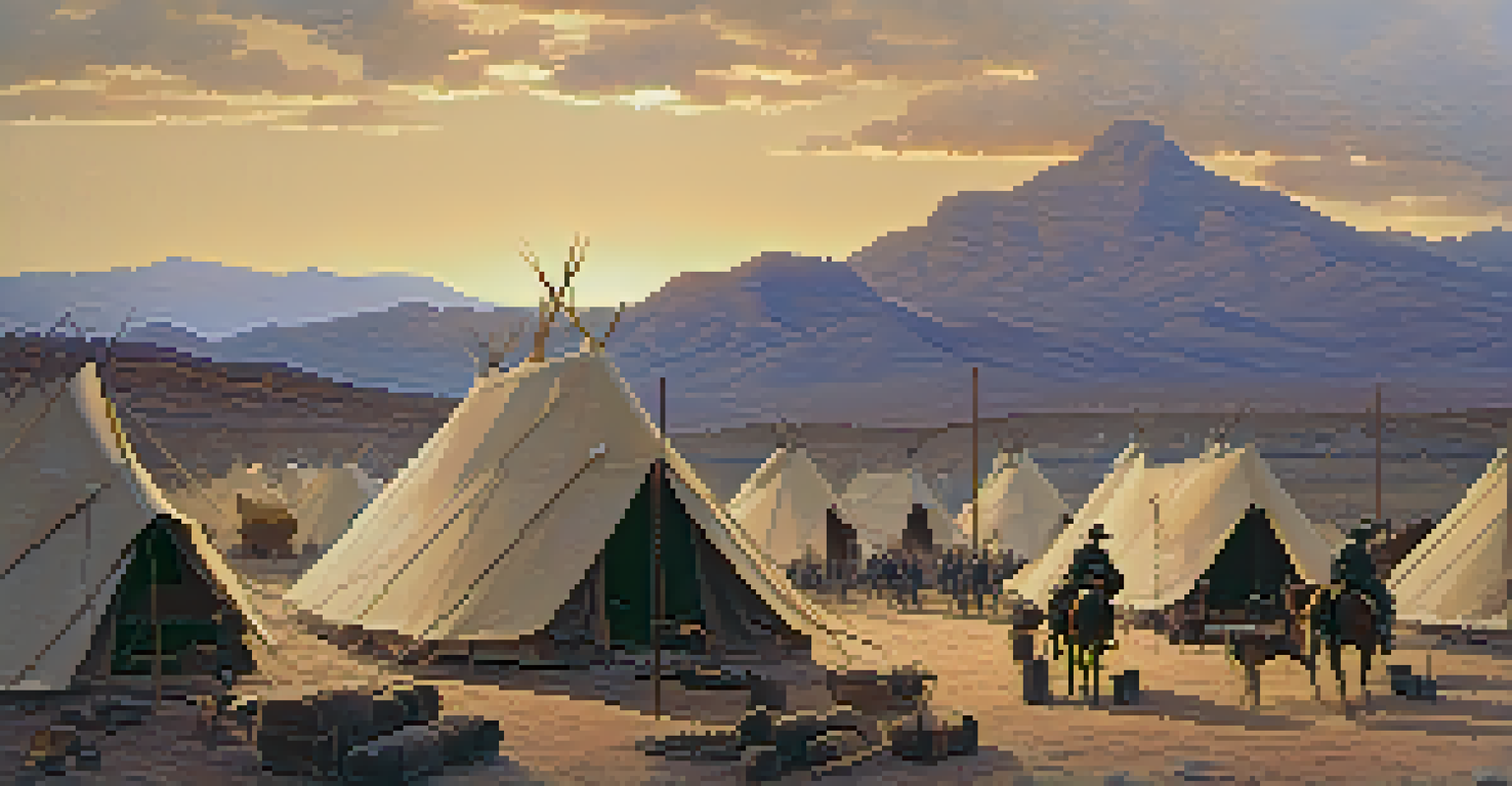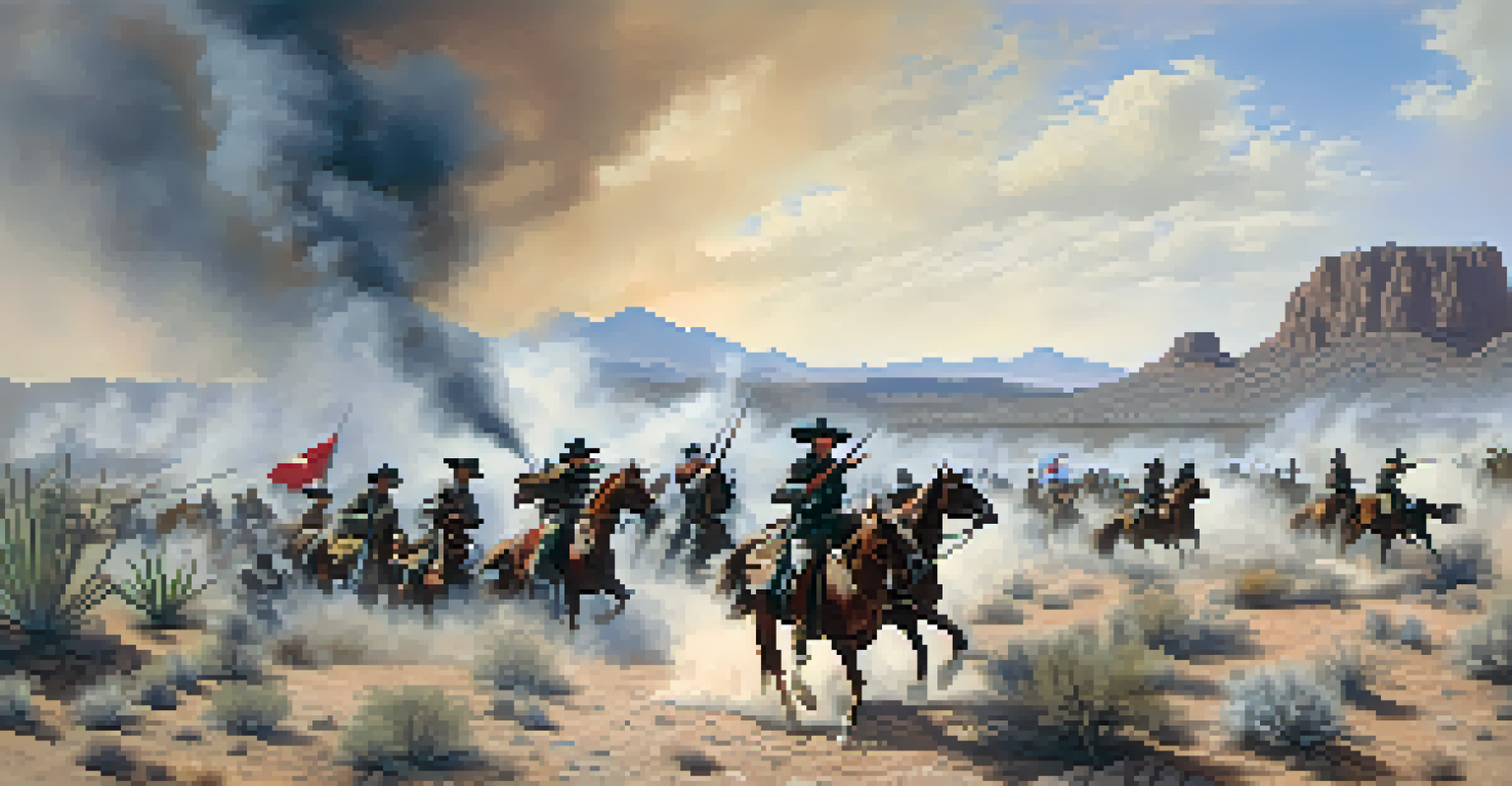Arizona's Contribution to the Civil War: A Historical Overview

Overview of Arizona's Status During the Civil War
During the Civil War, Arizona was a territory, not yet a state, and its role was often overshadowed by more prominent battlegrounds. Despite its geographic distance from major conflicts, Arizona found itself at the crossroads of national interests, especially regarding the Southern states. The territory was divided in loyalty, with many residents supporting both the Union and the Confederacy.
The Civil War was a turning point for the United States, shaping the future of the nation and its territories.
The population consisted of a mix of Native Americans, Mexicans, and Anglo settlers, each bringing their own perspectives on the war. This diversity influenced local allegiances, leading to a complex social fabric that reflected the nation’s turmoil. For many in Arizona, the war was not just a distant event but a local reality that impacted their lives directly.
As the war progressed, Arizona's strategic importance grew, particularly in terms of supply routes and military positioning. The area became a focal point for both Union and Confederate forces, each eager to gain control of the territory's resources. Understanding this background is crucial for appreciating Arizona's contribution to the Civil War.
Military Engagements and Conflicts in Arizona
Despite its relatively minor status, Arizona witnessed several military engagements during the Civil War, notably the Battle of Picacho Pass in 1862. This confrontation was significant as it was the westernmost battle of the conflict and showcased the strategic importance of the territory. The Union aimed to protect its supply lines and prevent Confederate forces from advancing into California.

The battle involved a small force of Union cavalry clashing with Confederate scouts, resulting in a surprising victory for the Union. This skirmish, while not large in scale, highlighted the tensions in the region and the commitment of both sides to control Arizona. It also set the stage for further military activities as both armies sought to assert dominance in the area.
Arizona's Role in Civil War Dynamics
Despite being a territory, Arizona played a crucial role in the Civil War through its strategic importance, diverse population, and local engagements.
In addition to formal battles, skirmishes and raids were common as both sides engaged in guerrilla warfare tactics. These smaller conflicts often involved local militias and highlighted the fragmented loyalties within Arizona. The persistence of these engagements kept the territory in the spotlight, despite its overall lack of large-scale battles.
The Impact of Native American Tribes in Arizona
The Native American tribes in Arizona, such as the Apache and Navajo, played a significant role during the Civil War, often navigating their own interests amid the conflict. Some tribes aligned with the Confederacy, hoping to leverage the situation to their advantage, while others sided with the Union, seeking protection from encroaching settlers. This dynamic added another layer of complexity to the war's narrative in Arizona.
A nation’s strength ultimately lies in the diversity and resilience of its people.
Tribal leaders recognized the war as an opportunity to assert their sovereignty and protect their lands from both Union and Confederate ambitions. The shifting allegiances reflected the tribes' desire for autonomy and the impact of the broader conflict on their livelihoods. This involvement of Native Americans illustrates how the Civil War was not solely a matter of North versus South but also involved significant local dynamics.
As the war progressed, many tribes faced the consequences of their choices, whether through military engagement or the repercussions of territorial disputes. The interplay between tribal politics and the war highlights the often-overlooked perspectives of Indigenous peoples in historical narratives. Their contributions and struggles deserve recognition in the context of Arizona's role in the Civil War.
Arizona's Economic Contributions to the War Effort
Arizona's economy during the Civil War was primarily based on agriculture and mining, which became vital to the war effort. The territory's mineral resources, particularly silver and copper, were essential for manufacturing weapons and supplies. As a result, both Union and Confederate forces sought to control these resources, leading to increased tensions and conflict.
Agriculture also played a crucial role, as crops produced in Arizona helped sustain troops and support local communities. Farmers worked tirelessly to ensure that their harvests could feed soldiers and civilians alike, demonstrating a commitment to the broader war effort. This agricultural backbone, often overlooked, highlights how even remote territories contributed to national struggles.
Impact of Native American Tribes
Native American tribes in Arizona navigated complex allegiances during the Civil War, significantly influencing the conflict's local dynamics.
Moreover, the war spurred economic activity in Arizona, as both armies established supply routes and built infrastructure. This development laid the groundwork for future economic growth in the region post-war, showcasing how the conflict inadvertently transformed Arizona's economy. The intersection of local resources and national needs illustrates the multifaceted contributions of Arizona during this tumultuous period.
Political Developments and Divisions in Arizona
The Civil War era saw significant political developments in Arizona, as local leaders grappled with their loyalties amidst national conflict. The territory's political landscape was marked by divisions, with pro-Union and pro-Confederate factions often clashing over control and influence. This struggle for power was not just about allegiance but also about the future direction of Arizona itself.
In 1861, the Confederate States of America attempted to establish a territorial government in Arizona, leading to a brief period of Confederate control. However, Union forces quickly countered these efforts, resulting in a tug-of-war for political dominance. This back-and-forth highlighted the tenuous nature of governance in a territory that was still finding its identity.
The war also prompted discussions about statehood and governance, with local leaders advocating for Arizona's inclusion as a state in the Union. These political aspirations were shaped by the war's outcomes, as communities sought stability and recognition in the post-war landscape. Understanding these political developments is key to comprehending Arizona's broader contributions to the Civil War.
Post-War Effects on Arizona's Society and Culture
The aftermath of the Civil War left a lasting impact on Arizona's society and culture, shaping the identity of the territory as it moved towards statehood. The war's conclusion brought about changes in demographics, with new settlers arriving and Native American tribes adjusting to shifting political realities. This influx created a melting pot of cultures that defined Arizona's future.
In addition to demographic changes, the war influenced social dynamics, as communities grappled with the consequences of conflict. Many soldiers returned home, bringing with them experiences that would reshape local narratives and traditions. The blending of different cultures and experiences contributed to a unique societal landscape that reflected both the challenges and resilience of the time.
Economic Contributions to the War
Arizona's agriculture and mining were vital to both Union and Confederate efforts, underscoring the territory's unexpected economic significance during the war.
Furthermore, the Civil War prompted discussions about civil rights and governance, laying the groundwork for future movements in Arizona. The legacy of the war continued to resonate, influencing everything from local politics to cultural expressions. Understanding these post-war effects is crucial for appreciating how the Civil War shaped Arizona's identity and trajectory.
Legacy of Arizona's Civil War Contributions Today
Today, Arizona's contributions to the Civil War are remembered and celebrated, albeit often overlooked in favor of larger battles. Historical sites, museums, and educational programs highlight the territory's unique role, ensuring that future generations recognize its significance. This legacy is essential for understanding not only Arizona's past but also its place in the broader narrative of American history.
Communities across Arizona engage in efforts to preserve and honor the memories of those who fought and lived during the Civil War. Events, reenactments, and commemorations serve to educate the public and foster a sense of connection to this pivotal period. By exploring these contributions, residents and visitors alike can gain insight into how the Civil War shaped the region's identity.

Ultimately, Arizona's role in the Civil War reflects the complexity of national struggles and the diverse narratives that define American history. Recognizing this legacy helps to enrich our understanding of not just Arizona, but the intricate tapestry of experiences that make up the United States. This ongoing dialogue about the past ensures that the contributions of all territories are acknowledged and valued.